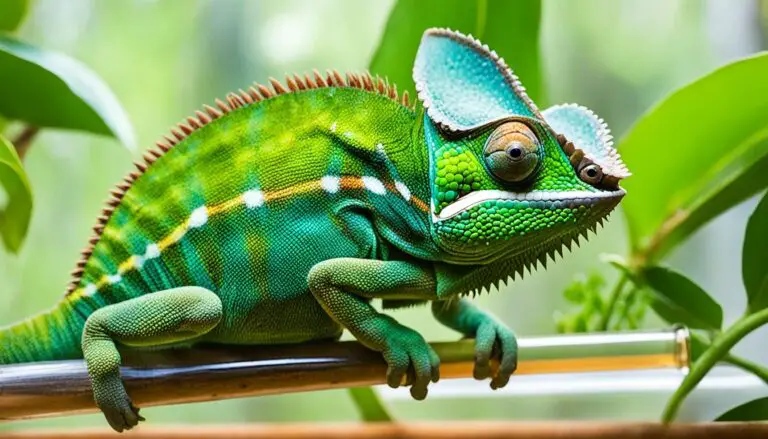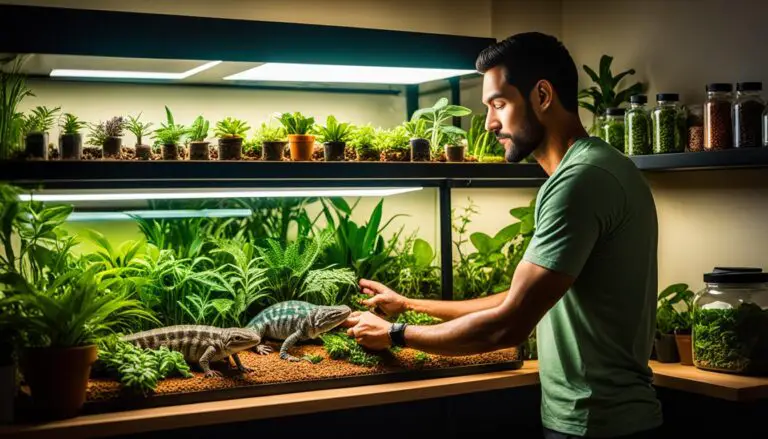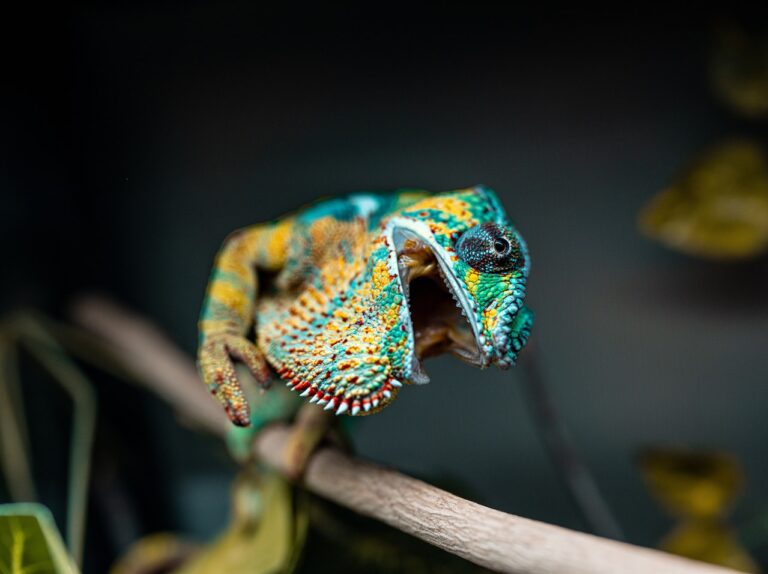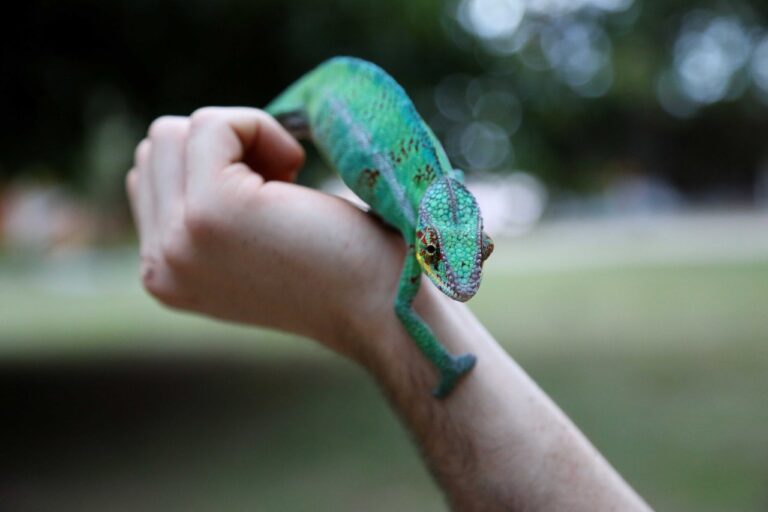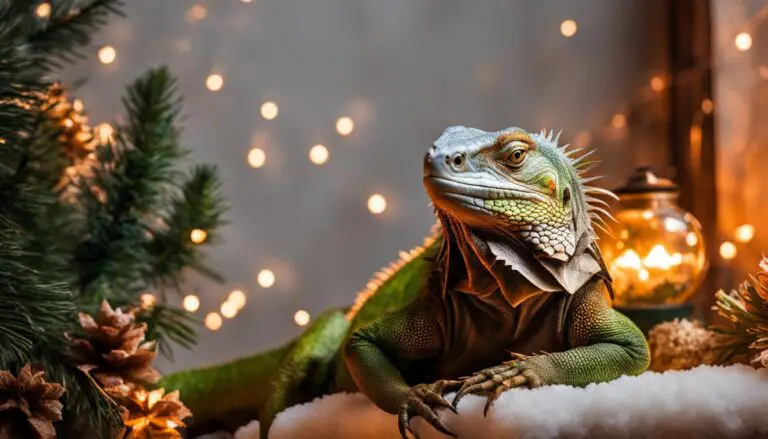Exotic Pet Care for Herbivores: Essential Tips
Welcome to our guide on caring for exotic herbivorous pets! Whether you have a rabbit, guinea pig, tortoise, or any other herbivore, it’s important to provide them with specialized care to ensure their health and well-being. In this article, we will discuss the key essentials of exotic pet care for herbivores, including their dietary needs, safe habitats, regular veterinary visits, and monitoring behavioral changes. By following these tips, you can provide the best care for your unique herbivorous companion.
Key Takeaways:
- Understanding the specific dietary needs of herbivorous exotic pets is crucial for their overall health and well-being.
- Creating a safe and comfortable habitat is essential to ensure the happiness and security of your herbivore.
- Regular veterinary visits are necessary to maintain the health of your exotic herbivorous pet.
- Proper feeding practices, including designing a balanced diet and using supplements when necessary, are important for their nutrition.
- Monitoring behavioral changes and providing an environment that encourages natural behaviors contribute to their overall well-being.
Understanding Your Herbivore’s Dietary Needs
Understanding the dietary needs of herbivorous exotic pets is crucial for their overall health. These unique animals have specific nutritional requirements that must be met to ensure their well-being and vitality. By providing a proper diet, you can help your herbivore pet thrive and enjoy a long, healthy life.
Fiber Intake for Digestive Health
Fiber plays a key role in the digestive health of herbivores. It promotes proper digestion and prevents gastrointestinal issues. By consuming a diet rich in fiber, your pet’s digestive system remains healthy, and they are less likely to experience problems such as constipation or diarrhea.
Include a variety of fiber-rich foods in your herbivore’s diet, such as:
- Leafy greens like kale, spinach, and romaine lettuce
- High-fiber vegetables like carrots, bell peppers, and squash
- Hay and grasses, which are essential for their dietary needs
- Specialized herbivore pellets that contain a balanced amount of fiber
Identifying Nutrient-Rich Foods for Exotic Pets
In addition to fiber, it’s important to provide your herbivore pet with nutrient-rich foods that supply essential vitamins and minerals. These nutrients are vital for their overall health, immune system function, and energy levels.
Include the following nutrient-rich foods in your pet’s diet:
- Dark, leafy greens like collard greens, dandelion greens, and mustard greens
- Colorful vegetables such as red bell peppers, sweet potatoes, and beets
- Fruits like berries, apples, and bananas (in moderation due to their sugar content)
- Herbs like parsley, basil, and cilantro, which provide additional flavor and beneficial compounds
Common Mistakes in Exotic Pet Nutrition
When it comes to exotic pet nutrition, it’s important to be aware of common mistakes that pet owners often make. By avoiding these mistakes, you can ensure your herbivore pet receives the proper nutrition they need for optimal health:
- Insufficient variety: Offering a limited range of foods can lead to nutrient deficiencies. Providing a diverse diet helps ensure they receive a wide range of vitamins and minerals.
- Overfeeding treats: While treats can be a fun way to bond with your pet, overfeeding them can negatively impact their overall nutrition and weight. Treats should be given in moderation.
- Ignoring hydration needs: Herbivores obtain a significant portion of their water intake from the foods they eat. Ensure your pet has access to fresh, clean water at all times.
- Inconsistent feeding schedule: Establishing a consistent feeding schedule helps regulate your pet’s digestion and prevents overeating.
By understanding your herbivore’s dietary needs, providing them with a balanced diet rich in fiber and nutrients, and avoiding common nutrition mistakes, you can ensure they are on the path to a healthy and fulfilling life.
Safe and Comfortable Habitats for Herbivorous Exotics
Creating safe and comfortable habitats is essential for the well-being of herbivorous exotic pets. By providing appropriate enclosures, adequate space for movement and exercise, and maintaining proper temperature and humidity levels, you can ensure their physical comfort. Additionally, offering enrichment activities that promote mental stimulation is crucial for their overall well-being.
Understanding the natural behavior and habitat requirements of herbivorous exotic pets is key to creating an environment where they can thrive. This involves researching their specific species and considering their unique needs. By replicating their natural habitat as closely as possible, you can provide a safe and comfortable space for your pet to feel secure and happy.
Creating a safe and comfortable habitat for your herbivorous exotic pet not only ensures their well-being but also allows them to exhibit natural behaviors and thrive in their environment.
In order to create a safe habitat for your exotic pet, here are some important considerations:
- Choose an enclosure that is appropriate for the size and specific needs of your pet. This may include tanks, cages, or outdoor enclosures.
- Provide ample space for your pet to move, exercise, and explore. This can be achieved through structure placement, branches, and toys.
- Maintain proper temperature and humidity levels consistent with their natural environment. This can be done through the use of heating lamps or mats, as well as humidifiers or misters.
- Ensure that the enclosure is escape-proof and free from any hazards or toxins that may harm your pet.
- Offer a variety of enrichment activities, such as foraging toys, puzzle feeders, and hiding places. This will help keep your pet mentally stimulated and prevent boredom or stress.
By following these guidelines and paying attention to the specific needs of your herbivorous exotic pet, you can create a safe and comfortable habitat that promotes their well-being and allows them to thrive.
Exotic Pet Care for Herbivores
Exotic pet care for herbivores requires specialized attention and best practices to ensure their health and well-being. Owners of herbivorous exotic pets must take into consideration their specific dietary needs, regular veterinary check-ups, proper housing and husbandry considerations, as well as monitoring any behavioral changes.
One of the essential aspects of caring for herbivorous exotic pets is providing them with a balanced and nutritious diet that meets their specific nutritional requirements. This includes incorporating a variety of nutrient-rich foods, such as fresh fruits and vegetables, into their daily meals. It is important to consult with a veterinarian or a pet nutritionist to design a diet that suits your pet’s needs.
Regular veterinary check-ups are crucial for the overall health and well-being of herbivorous exotic pets. These check-ups allow veterinarians to monitor your pet’s health, provide preventive treatments, and address any emerging health issues promptly. Remember to find a veterinarian who has experience in exotic pet care to ensure that your herbivorous pet receives the best specialized care.
Creating a safe and comfortable habitat is vital for the health and happiness of herbivorous exotic pets. This includes providing them with an appropriate-sized enclosure that allows for natural movement and exercise. Maintaining suitable temperature and humidity levels, providing enrichment activities, and using proper substrate are also important considerations to promote their well-being.
Monitoring your herbivorous exotic pet’s behavior is essential for detecting any changes that may indicate underlying health issues or stress. Being familiar with their natural behaviors will help you identify abnormalities or signs of discomfort. By creating an environment that encourages healthy behaviors and offers mental stimulation, you can contribute to their overall happiness and quality of life.
| Key Elements of Exotic Pet Care for Herbivores |
|---|
| Proper nutrition with a balanced and nutritious diet |
| Regular veterinary check-ups with an exotic pet specialist |
| Safe and comfortable habitats that meet their natural requirements |
| Monitoring behavioral changes for early detection of health issues |
By following these care guidelines and best practices, you can provide the specialized care necessary for your herbivorous exotic pet, ensuring their health and well-being for years to come.
Maintaining Health with Regular Veterinary Visits
Preventative Care through Routine Checkups
Regular veterinary visits are essential for the overall health and well-being of herbivorous exotic pets. Just like any other pet, they require routine checkups to ensure their optimal health. Preventative care through regular veterinary visits can help identify potential health issues before they become serious problems. By detecting and addressing any underlying health concerns early on, you can provide the necessary treatment and preventive measures to keep your herbivorous pet healthy.
Recognizing Early Signs of Health Issues
As a responsible pet owner, it’s important to be vigilant and observant when it comes to your herbivorous exotic pet’s health. Educate yourself about the early signs and symptoms that may indicate a health issue. These signs could include changes in behavior, appetite, weight, or appearance. By recognizing these early signs of health issues, you can promptly seek veterinary intervention and prevent the condition from worsening. Regular veterinary visits play a crucial role in diagnosing and treating health problems early, ensuring the best possible outcome for your pet.
The Importance of Expert Exotic Pet Veterinary Care
When it comes to exotic pets, including herbivorous species, specialized veterinary care is essential. Exotic animals have unique physiological and behavioral characteristics that require expertise and experience to understand and address effectively. By seeking the services of a veterinarian who specializes in exotic pet care, you can ensure that your herbivorous pet receives the highest level of veterinary care. These experts are knowledgeable about the specific needs and health concerns of exotic pets, and they have the necessary tools and resources to provide the best care possible.

| Benefits of Regular Veterinary Visits | Expert Exotic Pet Veterinary Care | Recognizing Early Signs of Health Issues |
|---|---|---|
| Early detection and prevention of health issues | Specialized knowledge about exotic pet care | Rapid intervention and treatment |
| Monitoring of weight, behavior, and overall health | Access to advanced diagnostic and treatment options | Prevention of complications and higher treatment success rates |
| Educational resources and guidance for proper pet care | Ability to handle emergencies and critical care situations | Peace of mind knowing your pet is receiving the best care |
Proper Feeding Practices for Exotic Herbivores
Proper feeding practices are crucial for the health and well-being of herbivorous exotic pets. By understanding their dietary needs and providing a balanced herbivore pet diet, you can ensure that they receive the necessary nutrients for optimal health.
Designing a Balanced Herbivore Pet Diet
When it comes to designing a balanced herbivore pet diet, it’s important to consider their specific nutritional requirements. The diet should consist of a variety of fresh fruits, vegetables, and high-quality hay or grass. This will provide them with essential vitamins, minerals, and fiber.
It’s also important to research the dietary preferences and restrictions of your specific herbivorous pet. Some exotic herbivores may require additional supplements to ensure their nutritional needs are met. Consult with a veterinarian experienced in exotic pet care to determine the appropriate supplements, if necessary.
Using Supplements and Specialized Feeds like Oxbow Critical Care®
Incorporating supplements into their diet can be beneficial for herbivorous exotic pets. Supplements can provide additional vitamins and minerals that may be lacking in their regular diet. One trusted brand of supplements for exotic pets is Oxbow Critical Care®.
“Using Oxbow Critical Care® for my herbivorous pets has made a noticeable difference in their overall health. The specialized formula ensures they receive the necessary nutrients, and the pets love the taste!” – Lisa, exotic pet owner
Oxbow Critical Care® is specifically formulated for herbivorous pets and can be used as a dietary supplement or a complete meal replacement in certain situations. Always consult with your veterinarian to determine the appropriate use and dosage for your pet.
Transitioning Diets with Veterinary Assistance
Transitioning diets for herbivorous exotic pets should be done with veterinary assistance to ensure a smooth and successful transition. Your veterinarian can guide you through the process, recommending gradual changes to prevent gastrointestinal upset.
It’s important to closely monitor your pet’s behavior and appetite during the transition period. Any sudden changes or signs of distress should be reported to your veterinarian immediately.
Remember, every herbivorous exotic pet is unique, and their dietary needs may vary. Consulting with a knowledgeable veterinarian will help you create a feeding plan tailored to your pet’s specific needs, ensuring they receive the best possible care.
The Specifics of Housing and Husbandry in Herbivore Pet Care
In addition to understanding the dietary needs of herbivorous exotic pets, providing appropriate housing and husbandry is crucial for their well-being. Each species has specific requirements for their enclosures, temperature, humidity, substrate, and enrichment activities. By creating an environment that meets these needs, you can promote their natural behaviors and overall health.
When designing the housing for your herbivorous pet, consider the following factors:
- Enclosures: Provide a spacious and secure enclosure that allows your pet to move around and exercise comfortably.
- Temperature: Maintain the appropriate temperature range, as different species have different temperature requirements.
- Humidity: Some herbivores require higher humidity levels, so it’s important to create a suitable humidity environment within their enclosure.
- Substrate: Choose a substrate that is safe, easy to clean, and mimics the natural habitat of the species.
- Enrichment activities: Include various forms of enrichment, such as hiding spots, climbing structures, and toys, to keep your pet mentally stimulated.
By addressing these specific considerations for housing and husbandry, you can ensure that your herbivorous pet feels safe, secure, and comfortable in their living environment.

Proper housing and husbandry are essential elements of herbivore pet care. They contribute to the overall well-being and happiness of your pet, allowing them to express their natural behaviors. By providing the right enclosures, maintaining suitable temperature and humidity levels, selecting appropriate substrate, and incorporating enrichment activities, you can create a thriving environment for your herbivorous companion.
Monitoring and Adapting to Behavioral Changes
Monitoring and adapting to behavioral changes in herbivorous exotic pets is crucial for ensuring their overall well-being and quality of life. By understanding their natural behaviors and responses to stress and environmental changes, you can create a healthy and supportive environment that encourages healthy behaviors.
Understanding Natural Behaviors for Better Care
To provide the best care for your herbivorous exotic pet, it is important to have a thorough understanding of their natural behaviors. Each species has unique behaviors that are essential for their survival and well-being. By observing and familiarizing yourself with their natural behaviors, you can better identify any potential issues or signs of distress.
Responses to Stress and Environmental Changes
Exotic pets, like all animals, can experience stress and anxiety in response to various factors. Changes in their environment, such as a new enclosure or introduction to a new companion, can trigger stress responses. It is important to recognize these signs of stress and respond accordingly, adapting the environment or providing additional support to help them cope.
Creating an Environment that Encourages Healthy Behaviors
Designing a healthy environment for herbivorous exotic pets involves providing appropriate enrichment activities, suitable social interactions, and a comfortable habitat. Enrichment activities help stimulate their natural behaviors and prevent boredom, while social interactions with compatible companions can promote mental stimulation and overall well-being. Additionally, ensuring a comfortable and secure habitat with proper temperature, humidity, and substrate choices is crucial for their physical health.
By monitoring their behaviors, understanding their natural instincts, and creating an environment that supports their well-being, you can provide the best care for your herbivorous exotic pet and help them live a happy and fulfilling life.
Conclusion
In conclusion, providing proper care for your herbivorous exotic pet is essential for their overall well-being and happiness. By understanding and addressing their dietary needs, you can ensure they receive the necessary nutrients for optimal health. Creating safe and comfortable habitats will allow them to thrive and exhibit their natural behaviors.
Regular veterinary visits are crucial to monitor their health and catch any potential issues early on. By observing and adapting to behavioral changes, you can provide a supportive environment that encourages their overall happiness. Taking these essential tips and best practices into consideration, you can become a knowledgeable and responsible owner who cares for their unique herbivorous pet.
Remember, exotic pet care is a continuous learning process, and staying informed about the specific needs of your pet is key. By following this herbivore pet care guide, you pave the way for a long, fulfilling, and healthy life for your exotic pet.
Source Links
- https://griffinexotics.com/exotic-pet-care-questions-guidelines/
- https://www.vettimes.co.uk/app/uploads/wp-post-to-pdf-enhanced-cache/1/nutrition-for-exotics-correct-diets-will-prevent-problems.pdf
- https://www.oxbowaustralia.com/critical-care-information-for-pet-owners/
Peter Stones is the founder of Exotic Pets Place, the leading online resource for exotic pet care information.
With over 10 years of hands-on exotic pet ownership experience, he is deeply passionate about sharing his expertise to help others properly care for their unusual pets.
When he's not writing extensively researched articles or connecting with fellow exotic pet enthusiasts worldwide, you can find Peter at home tending to his own beloved menagerie of exotic animals.


